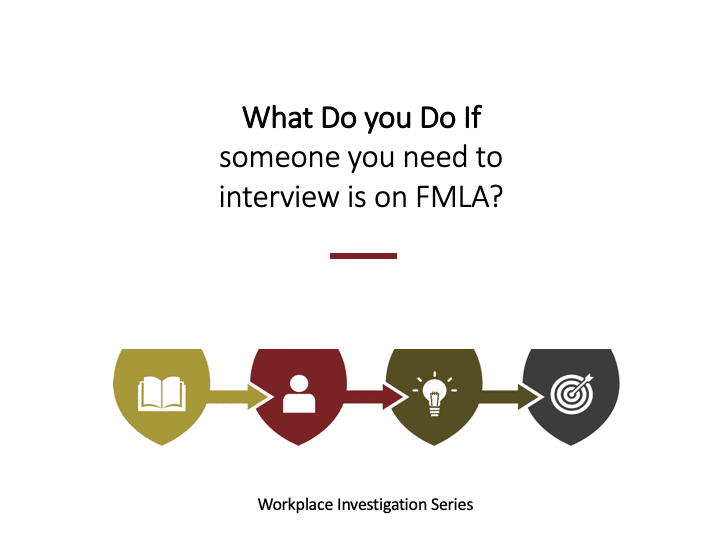What do you do if someone you need to talk to is on FMLA?
You do what your client tells you to do. So, most investigators are not also FMLA experts. I do realize those both fall under employment law, so some of us are, but most people are not experts in investigations and FMLA, so I’ll tell you to always revert to the advice of either your client or the expert in the area. Generally speaking, if somebody’s on FMLA, they’re not supposed to be working, and so you don’t investigate it. Sometimes that comes into conflict with your obligation to do a prompt investigation. You need to be able to document why you’re not moving forward, so that’s what you do.
You don’t need to say why they’re on FMLA unless it’s pertinent. If you’re investigating an injury that has caused them to be on FMLA, that’s probably pertinent. Sometimes, though, FMLA means they can’t work but can do little things. So maybe they can talk to you for five minutes, and you say, “Okay, I’ve thought about it a lot. I have two questions I think I can ask you in five minutes if that’s what your doctor allows.”
Sometimes they had eye surgery, and they can’t open their eyes, but it doesn’t mean their brain isn’t working. So a reasonable accommodation, again, with the consent and engagement of both the doctor and the reporting party, the doctor and the client, if it seems like an okay thing to do, you could say, “I understand that you can’t open your eyes because you just had eye surgery. Do you think we could have a phone call? Let’s not do a video because you can’t open your eyes, but could we have a phone call?”
Or, “I only am awake for ten minutes here and there,” maybe the thing you could do then is, “Well if I write you a list of questions, could you respond to them? Either record the answers in video or write them out for me?”
So sometimes, with FMLA, you can do little things that are good enough to either get an investigation started or corroborate one piece of evidence. And relatedly, you need to check in with your client about this, but those people probably need to get paid for that time, almost certainly need to get paid for that time. So you need to be also in contact with your client about the exact number of minutes you talk to that person so they can get paid for that time.
